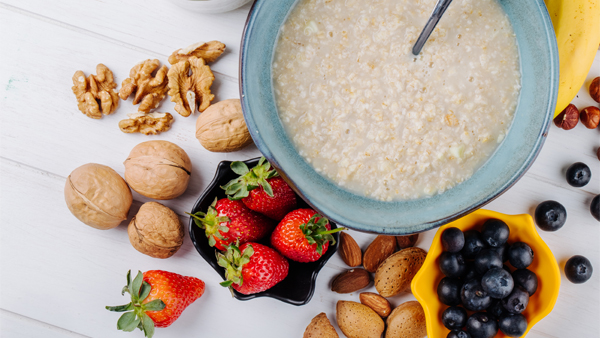Iron for babies
Iron is one of the most important nutrients for a baby. Babies are born with iron reserves for around 6 months. After that, they need to eat iron-rich food to make sure they get enough. It doesn't have to be complicated! We've collected facts and tips about iron.
Read time: 5 m
Verified by Sara Ask
Licensed dietitian
Iron is needed for the transport of oxygen in the blood and for the baby to grow. Some are also needed for brain development. The recommended daily intake of iron is 8 milligrams per day for a baby. That's almost as much as the recommended daily intake for an adult man. But a baby neither can nor should eat as much food as an adult - that's why it's so important that the food the baby gets is rich in iron. But you don't need to calculate the amount of iron. It's just important that you know what food contains iron and then serves it to your baby. A few examples:
Iron-enriched porridge - bought or homemade
If you want to make your own, you can enrich it with 1 tablespoon of finely ground sunflower seeds.
You can also make baked porridge fingers that the baby can hold in their hand. Blend a cup of oats in your food processor to make a fine powder and mix it with half a cup of oats and half a teaspoon of baking powder. Add 1 tablespoon rapeseed oil, 100g mashed banana/fruit puree, and 1 egg, and stir. Spread a square on a baking sheet lined with baking paper, about 1 cm thick. Bake in the middle of the oven at 200 degrees for about 15 minutes. Allow to cool and cut the baked porridge into fingers, large enough for the baby to hold in their hand.
Eggs
Give your baby some chunks of egg. You could also scramble some eggs and serve them on some buttered toast. It can be tricky for the baby to handle a hard outer surface and a creamy middle at the same time.
Tofu
Doesn't need to be cooked - serve it in sticks or small pieces. You can also serve it mashed with avocado. How about in a tasty stew? Tofu is great at absorbing flavour.
Pate
Spread it on a small sandwich or cracker.
Spaghetti bolognese with mince or veggie mince.
Mix the sauce well.
Lentils, peas and beans
Red lentils are peeled and a good thing to start with for your baby's stomach. Boil and season with a mild spice and a splash of oil or coconut milk. Then you can gradually try mashing other beans, e.g. chickpeas or black beans.
Salmon
Oven baked or pan-fry.
Nuts and seeds
Mix to a paste so your baby doesn't choke. Nuts or seeds can also be mixed into a stew to make it more creamy and nutritious.
What about breast milk?
Breast milk doesn't contain large amounts of iron - but some substances make the iron extra easy for the body to absorb. That means that breast milk is also a source of iron while the baby is learning to eat food. The formula contains more iron than breast milk, to compensate for the fact that it's not as easy for the body to absorb the formula.
There is no iron in cow's milk or plant-based milk
Cow's milk and plant-based milk don't contain iron so it's not a good idea to give it in a bottle to babies under one. A little bit of food is completely fine. Milk contains other nutritious substances.
Fruit and vegetables help the absorption of iron
Vitamin C-rich fruits and vegetables make the iron in vegetarian food easier for the body to absorb. Citrus fruits, parsnips, peppers, cauliflower and broccoli provide a good source of vitamin C.
Supplements - only for babies who need them
Some babies like breast or bottle feeding so much that they don't want to try other food. If months go by without the baby eating much, you can check with your healthcare centre to see if they need to perform a blood test to check the baby's iron levels.
In most cases, there's plenty of time to encourage the baby to eat iron-rich food. If the baby still doesn't want to eat solid food at 8-10 months old, it may be appropriate to consider iron supplements to prevent the baby from becoming iron deficient.
But this decision should be made by a doctor
You might be wondering: if iron is so important - shouldn't all babies be given iron supplements? The problem with iron is that the body can't get rid of any excess iron. In addition, pathogenic bacteria thrive well in an intestine with a lot of iron - so that's why iron is only given to babies who need it. Just the right amount of iron is best.
Verified by Sara Ask
Licensed dietitian
More from Preggers
Hundreds of related articles, podcasts & more waiting for you in the Preggers app.
Download Preggers today.

